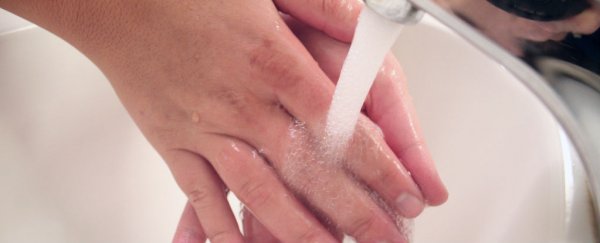
Knowing how to wash your hands properly is crucial: germs can be easily passed to others through physical contact or by leaving microbes on taps and doorknobs, and we can just as easily make ourselves ill by allowing these harmful microorganisms to flourish on our fingertips. A single gram of human faeces can contain as many as one trillion germs - something to think about the next time you visit the bathroom.
And yet despite the importance of handwashing, a lot of us get it wrong or don't do it comprehensively enough. Recent studies have discovered that only 5 percent of us spend enough time washing our hands, 23 percent of us don't use soap, and a little over 10 percent of people don't bother washing their hands at all. That's a lot of unchecked germs and a high risk of contamination.
So the team at You're Doing It Wrong has put together a video that shows some of the dangers of not washing your hands properly, and suggests some better practices to adopt. As well as making sure you use soap and wash your hands for a sufficient length of time - most experts say at least 20 seconds should do the trick - it's also important to focus on the fingertips. These parts of your hands come into contact with other objects and other people most often.
You should also be consistent in your handwashing: just because you've diligently washed your hands the last nine times you visited the bathroom doesn't mean you can skip the tenth. If you have the choice, it's also a good idea to use paper towels to dry your hands rather than hand driers that blast out jets of air - these are less effective at actually drying your hands, and wet hands are worse than dry hands for spreading bacteria.
What's more, the temperature of the water you use isn't as crucial as adding soap to the mix and making sure both your hands are as clean as possible. Just find a a temperature you're comfortable with and sticking to it.
Watch the video above to find out more about how you can improve your hand-washing routine, and also why hygiene pioneers Ignaz Semmelweis and Josephine Baker were initially met with hostility when they tried to impose stricter cleaning protocols in hospitals. Talk about doing it wrong.

